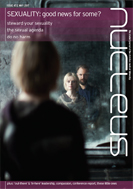It's cold upstairs at the street kids' centre and I shiver in my jumper. The children sit in thin tops, thoroughly inured. I'm doing coping techniques with the eight and nine-year-olds. Breathing techniques, superheroes and bits of soft cloth have all gone well. Now we're making pictures of a magical safe place where everything is perfect.In the centre, two boys place a working light bulb.To get a place here, kids need to be neglected,abused and exploited. The centre can't stretch to all the child beggars, or all the kids who're roaming around, hungry. They simply grow up as best they can, alone.
The children are 'Egyptianes', visibly different from the community around them and generally despised. No one would give work to an Egyptiane: 'everyone knows' they only beg and steal. For generations, they're left as the only career options. In psychiatry, we talk about 'secondary deviance':the effect society's rejection has on you. In this community, girls are often forced to marry at twelve or 13. The legal age is 18 but the state doesn't care. Those 13-year-old mums were themselves brought up by mums who married by 13 and survived the same domestic violence the current mums do now. Predictably, many adults here have alcohol problems.
The kids live with their families in derelict squats.Few attend school: their families rely on the money they get begging and being the class 'Egyptiane' isn't fun.
Social workers and police assume that these kids lie. Fostering doesn't happen here and there's a shortage of places in children's homes. Maybe that's why officials ignore kids who've been beaten unconscious, who're hungry and cold. Maybe, knowing the nature of so many large homes, they reckon it's better being abused within your family than within a children's home.
How do you bring hope in situations like this? The centre is doing the most important thing: giving children an experience of reliable love and care. By caring, they're teaching the next generation to parent. By caring, they're showing them God.
And what can you do as a foreign doctor? First do no harm. I'm trained in trauma therapies but can't use them here. You need to be safe before therapy can happen: these wee souls need all of their defences.
Second, accept that your role is supportive. The steady love and care from centre staff is so much more important than anything I bring. Nothing I do here will last if it's not taken on by staff. I need to bring teaching so they understand the problems, and leave techniques that they can use themselves. That means building long-term relationships, being available for problems and learning what they need.
Encouragement is vital. Caught between an unresponsive system and their care for the children, I don't get how they manage to stay sane. Being involved means they know there are people elsewhere who care about them and their work, acknowledging the importance of what they do and how well they're managing a hard situation. Here, in the darkness, they're demonstrating Christ.
The children are 'Egyptianes', visibly different from the community around them and generally despised. No one would give work to an Egyptiane: 'everyone knows' they only beg and steal. For generations, they're left as the only career options. In psychiatry, we talk about 'secondary deviance':the effect society's rejection has on you. In this community, girls are often forced to marry at twelve or 13. The legal age is 18 but the state doesn't care. Those 13-year-old mums were themselves brought up by mums who married by 13 and survived the same domestic violence the current mums do now. Predictably, many adults here have alcohol problems.
The kids live with their families in derelict squats.Few attend school: their families rely on the money they get begging and being the class 'Egyptiane' isn't fun.
Social workers and police assume that these kids lie. Fostering doesn't happen here and there's a shortage of places in children's homes. Maybe that's why officials ignore kids who've been beaten unconscious, who're hungry and cold. Maybe, knowing the nature of so many large homes, they reckon it's better being abused within your family than within a children's home.
How do you bring hope in situations like this? The centre is doing the most important thing: giving children an experience of reliable love and care. By caring, they're teaching the next generation to parent. By caring, they're showing them God.
And what can you do as a foreign doctor? First do no harm. I'm trained in trauma therapies but can't use them here. You need to be safe before therapy can happen: these wee souls need all of their defences.
Second, accept that your role is supportive. The steady love and care from centre staff is so much more important than anything I bring. Nothing I do here will last if it's not taken on by staff. I need to bring teaching so they understand the problems, and leave techniques that they can use themselves. That means building long-term relationships, being available for problems and learning what they need.
Encouragement is vital. Caught between an unresponsive system and their care for the children, I don't get how they manage to stay sane. Being involved means they know there are people elsewhere who care about them and their work, acknowledging the importance of what they do and how well they're managing a hard situation. Here, in the darkness, they're demonstrating Christ.































